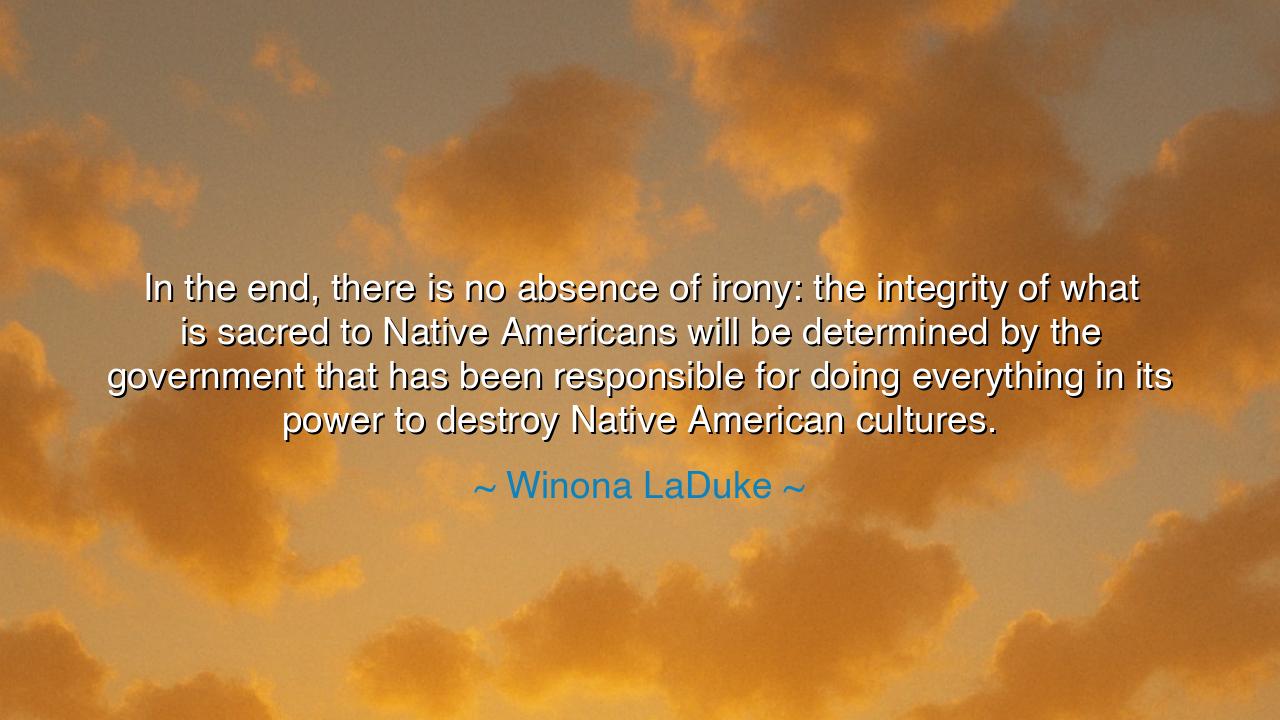
In the end, there is no absence of irony: the integrity of what
In the end, there is no absence of irony: the integrity of what is sacred to Native Americans will be determined by the government that has been responsible for doing everything in its power to destroy Native American cultures.






The words of Winona LaDuke, spoken with the sorrowful clarity of one who has seen history’s cruel symmetry, pierce the heart: “In the end, there is no absence of irony: the integrity of what is sacred to Native Americans will be determined by the government that has been responsible for doing everything in its power to destroy Native American cultures.” In this statement lies both grief and wisdom, both accusation and prophecy. It is a lament for what has been lost, and a warning for what may yet be lost again. LaDuke—an Anishinaabe activist, economist, and keeper of ancestral memory—speaks not only of her people, but of all peoples who have suffered under the weight of conquest and colonization. Her words call us to confront a painful truth: that the power to protect the sacred has fallen into the hands of those who once desecrated it.
The origin of this quote comes from LaDuke’s lifelong struggle to defend Indigenous lands, sovereignty, and spiritual traditions. For centuries, Native Americans lived in harmony with the earth, seeing the land not as property, but as a living being, a relative bound by spirit. But with the arrival of colonial powers came the relentless machinery of domination—governments that seized territories, outlawed languages, banned ceremonies, and tore children from their families to “civilize” them. LaDuke, who has devoted her life to resisting environmental destruction and cultural erasure, speaks from within this long shadow. The irony she names is not poetic—it is historical. The very institutions that tried to annihilate Indigenous identity now presume to regulate, define, and “protect” what little remains of the sacred.
In the style of the ancients, let us pause and reflect upon this irony. How can the destroyer become the protector? How can the thief become the guardian of what he has stolen? LaDuke’s words are not only about hypocrisy—they are about the loss of moral authority. For a government that has sanctioned the breaking of treaties, the desecration of burial grounds, and the poisoning of rivers cannot be trusted to measure the holiness of another’s way of life. Yet such is the reality that Native nations must endure. They must petition for the right to pray on their own lands, seek legal permission to visit their own sacred sites, and rely upon courts to determine the fate of their ancient traditions. The sacred, which belongs to no man, has been reduced to a matter of policy and procedure.
Consider the story of the Black Hills of South Dakota, sacred to the Lakota people. These lands, known as He Sapa, are the spiritual heart of the Lakota nation—a place of vision, ceremony, and creation. Yet when gold was discovered there, the U.S. government violated the Treaty of Fort Laramie, seized the territory, and drove the Lakota from their ancestral home. Decades later, in 1980, the Supreme Court ruled that the land had indeed been taken illegally. But instead of returning it, the Court offered monetary compensation. The Lakota refused the money, saying, “The Black Hills are not for sale.” To this day, they continue their struggle to reclaim them. Is this not the very irony LaDuke speaks of?—that the government that broke its word now stands as the arbiter of justice, offering gold where only reverence should dwell.
LaDuke’s quote also reveals a deeper wound—the spiritual violence that accompanies political domination. For to destroy a culture, one must first destroy its sense of the sacred. When the drumbeat was silenced, when the languages were forbidden, when the ceremonies were outlawed, the invaders did not merely conquer bodies—they conquered souls. And now, in an age of environmental collapse, the world turns back to Indigenous wisdom, seeking guidance on how to live with the earth. Yet even this awakening is tinged with tragedy, for those who once scorned the sacred now claim to defend it under the name of law, while the original keepers of the earth remain dispossessed.
But LaDuke’s words are not only a cry of despair—they are a call to remembrance and to action. They remind us that reconciliation without justice is hollow, and that to heal what has been broken, one must restore not only lands, but the right to define what is sacred. True respect for Indigenous nations requires more than apology—it demands the return of agency, the honoring of treaties, and the humility to recognize that wisdom older than empire still walks this earth. The sacred cannot be legislated; it must be lived, honored, and protected by those who understand its language.
So, my children of the future, take this teaching from Winona LaDuke to heart: the sacred belongs to those who love it. Governments may pass laws, courts may issue rulings, but the soul of a people cannot be governed. Do not let irony become your inheritance; do not let power decide what holiness means. Instead, listen—to the rivers, the forests, the elders who still remember. Seek justice not through conquest, but through restoration. And when you stand before what is sacred, whether it be land, culture, or life itself, stand not as an owner, but as a guardian.
For LaDuke’s truth is eternal: when those who once destroyed are allowed to define what is sacred, the cycle of destruction continues. Break that cycle. Honor the ancient covenants between humanity and the earth. Let every act of justice, every defense of the sacred, be not a policy, but a prayer. Only then will the irony end, and the healing of the world begin.






AAdministratorAdministrator
Welcome, honored guests. Please leave a comment, we will respond soon